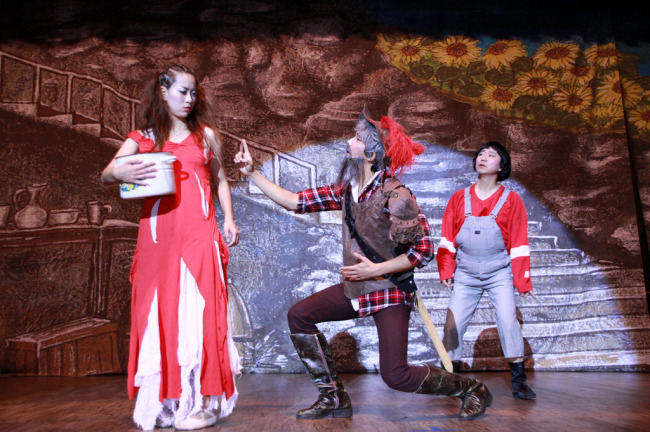Musical troupe overcomes disability with sign language, facial expression
By Kim Young-wonPublished : April 2, 2013 - 19:46
Every show by musical troupe K.SMART ends with a standing ovation, prompted not only by their performance, but also a sense of empathy, inspiration and respect for the performers who are deaf and mute.
The Korean Sign-language Musical Art Team consisting of 20 performers with hearing disabilities has been staging musicals for more than a decade at home and abroad.
Despite the sophisticated choreography and vivid acting, one essential part of a musical is absent: the performers’ own voices.
The Korean Sign-language Musical Art Team consisting of 20 performers with hearing disabilities has been staging musicals for more than a decade at home and abroad.
Despite the sophisticated choreography and vivid acting, one essential part of a musical is absent: the performers’ own voices.

While prerecorded songs are played, they deliver the lyrics via sign language and facial expressions.
“They are actually able to express the emotions of songs better than anyone else. They have an unrealized artistry in themselves,” said Kim Hyun-ho, general director of K.SMART. “The disabled are differently abled.”
Their works include “Maria Maria,” a Christian musical based on the Bible, and “Don Quixote,” a musical adaptation of the chivalric novel with the same name.
More non-disabled people than disabled come to enjoy the musicals. The audience is amazed upon learning that most of the performers are deaf. They often say they thought that the actors and actresses could hear the music since their moves were perfectly in sync with it.
Through the musicals, the disabled performers can also build up their confidence and find themselves renewed.
“I thought I was useless. But I have found out who I really am. I also learned to work together with others while doing the musical,” said Jeong Jin-seong, who plays the protagonist in the musical Don Quixote.
Since its foundation in 1997 the musical troupe has held more than 1,000 musicals at home and abroad, including in Uzbekistan, Hong Kong and the United States, to name a few.
They will take a trip to Kenya, Africa, in September to perform there.
Holding regular performances four times a year at a theater called Mimique, a French word for “body movement” or “facial expression,” the musical team performs musicals as well as ballet and dance at larger theaters that can accommodate 200 people or even up to 1,000.
Kim, who directs everything with his wife, from making musicals and choreography to choosing songs, is not a professional musical performer.
The only education he has received for the stage was a six-month musical course at a private performing arts school, which means he basically taught himself by “watching, listening and doing it despite limited abilities.”
Kim explained that it was communication between the actors and audience that led them to sympathize with each other.
“The performers notice music beats are becoming fast when audience claps fast to the beat, and then both the musical performers and audience get excited,” Kim said.
The musical team practices once a week, or two or three times a week when they have a performance scheduled.
And instead of typical voice training, they receive instruction on how to express emotions through their hands, body movements and facial expressions.
“These musical members feel the music through their whole bodies,” Kim said.
The musical team is scheduled to stage a musical adaptation of the novel “Sorrows of Young Werther” on April 5 and 6 at Mimique in Jongno, Seoul.
The proceeds of the event will be given to people with hearing impairments who are also suffering from cancer or rare diseases.
Kim said he hoped to help more hearing impaired people find their ability and take to the world stage.
By Kim Young-won (wone0102@heraldcorp.com)








![[Graphic News] More Koreans say they plan long-distance trips this year](http://res.heraldm.com/phpwas/restmb_idxmake.php?idx=644&simg=/content/image/2024/04/17/20240417050828_0.gif&u=)
![[KH Explains] Hyundai's full hybrid edge to pay off amid slow transition to pure EVs](http://res.heraldm.com/phpwas/restmb_idxmake.php?idx=644&simg=/content/image/2024/04/18/20240418050645_0.jpg&u=20240419100350)





![[From the Scene] Monks, Buddhists hail return of remains of Buddhas](http://res.heraldm.com/phpwas/restmb_idxmake.php?idx=652&simg=/content/image/2024/04/19/20240419050617_0.jpg&u=20240419175937)

![[KH Explains] Hyundai's full hybrid edge to pay off amid slow transition to pure EVs](http://res.heraldm.com/phpwas/restmb_idxmake.php?idx=652&simg=/content/image/2024/04/18/20240418050645_0.jpg&u=20240419100350)

![[Today’s K-pop] Illit drops debut single remix](http://res.heraldm.com/phpwas/restmb_idxmake.php?idx=642&simg=/content/image/2024/04/19/20240419050612_0.jpg&u=)